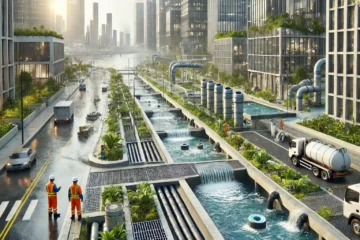Meta Description: Discover the vital role of contracting companies in designing and implementing stormwater drainage and treatment systems in coastal cities. Learn about the challenges and sustainable solutions they provide.
Introduction
Managing stormwater in coastal cities is a critical task for preserving infrastructure and minimizing the risks of flooding. With climate change and increasing rainfall intensity in certain areas, the role of contracting companies has become pivotal in establishing efficient systems for stormwater drainage and treatment. This blog highlights the essential steps taken by contracting companies to ensure environmental and economic sustainability.
1. The Importance of Stormwater Management in Coastal Cities
Coastal cities face unique challenges in stormwater management due to their proximity to seas and high groundwater levels. The importance of addressing stormwater includes:
- Flood Prevention: Reducing water accumulation in streets and residential areas.
- Infrastructure Protection: Preventing erosion of roads and buildings caused by waterlogging.
- Environmental Preservation: Mitigating pollution of groundwater and marine ecosystems caused by stormwater runoff.
- Water Reuse: Creating opportunities to reuse stormwater for irrigation or industrial purposes.
2. The Role of Contracting Companies in Stormwater Management
Contracting companies play a critical role in designing and implementing stormwater drainage and treatment systems.
A. Designing Modern Drainage Systems
- Integrated Drainage Networks: Creating systems with pipelines, channels, and collection points.
- Storage Reservoirs: Building tanks to collect and store excess water for reuse.
- Ventilation Systems: Ensuring efficient water flow and preventing blockages.
B. Advanced Treatment Technologies
- Mechanical Filters: Removing solid debris from stormwater.
- Biological Treatment Plants: Addressing organic pollutants.
- Sand Filtration Systems: Purifying water before releasing it into seas or for reuse.
C. Innovative Solutions for Coastal Areas
- Salt-Resistant Systems: Addressing challenges caused by saline water.
- Sustainable Designs: Using eco-friendly materials and methods to minimize environmental impact.
3. Challenges Faced by Contracting Companies
A. High Groundwater Levels
- Issues with digging channels and installing pipelines.
- Solutions: Using advanced excavation technologies and proper sealing materials.
B. Climate Change Impacts
- Unexpected increases in rainfall volumes.
- Solutions: Designing flexible systems capable of handling higher loads.
C. Pollution Concerns
- Runoff carrying oil, chemicals, and other pollutants.
- Solutions: Installing treatment plants specialized in removing industrial pollutants.
4. Advanced Technologies in Stormwater Management
A. Internet of Things (IoT) Sensors
- Monitoring water levels and quality in real-time.
- Sending alerts during critical conditions.
B. Building Information Modeling (BIM)
- Simulating water flow and identifying flood-prone areas.
C. Rainwater Harvesting Systems
- Utilizing roofs and paved surfaces to collect water.
- Redirecting it for irrigation or potable uses after treatment.
5. Successful Case Studies
Case Study 1:
A contracting company successfully implemented an innovative drainage system in a coastal city using corrosion-resistant channels and smart storage systems, reducing flooding incidents by 70%.
Case Study 2:
In an industrial coastal area, a company established a stormwater treatment plant using Membrane Bioreactor (MBR) technology, allowing water purification and reuse in industrial operations.
Conclusion
Contracting companies play a crucial role in enhancing infrastructure to manage stormwater effectively, especially in coastal cities facing unique challenges. By adopting innovative technologies and sustainable strategies, these companies contribute to environmental protection and improved quality of life for residents.



